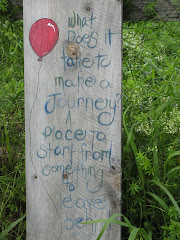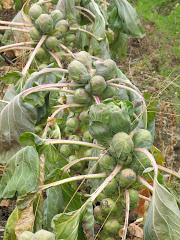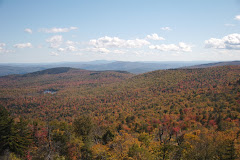It is hoarding season. It comes with the longer nights and the chilly mornings and the leaves that turn red and brown and orange and fall from the branches. It comes with the first early frost, with the squash harvest and the harder sunsets in the west. My house is slowly filling up with the good, hard food that will keep me going in the winter: potatoes, pie pumpkins, winter squash, onions. It is hard to go a whole season without green things. In this age of planes and computers we are used to getting whatever we want whenever we want it. I am not immune to this. In the darkest months I crave fresh lettuce, red peppers and blueberries. I don’t go six months without eating anything green. But there is something important about the need to prepare for a season. There is something important in the act of storing away food and strength for the times we’ll need them most. There is something that happens to the body, a reaction to the cold and the darkness, a need to keep things close. Maybe it is just basic human instinct, like the instinct to keep warm and to eat and to be with other people.
It is hoarding season. Winter food is different from summer food. In the cold months I crave thick potato soup, fried onions, roasted squash and pumpkin seeds, leeks simmered a long time in fragrant broth. Food is our most basic need, and whether we notice it or not, it links us directly to the soil, the rain, the sunlight. It is hoarding season. This week in a friend’s bright kitchen on the edge of the woods, I jarred ten quarts of applesauce. It was a clear cool night one day before the full moon. I peeled apples while Jo chopped tomatoes. We set two big pots on the stove, side by side, and the smells of harvest filled the kitchen and spilled out into the night. Apples, honey, cinnamon, cloves, tomatoes, basil, parsley, garlic. We watched and talked as the apples bubbled and fell apart into a golden fragrance and the red tomatoes thickened as they cooked.
It is hoarding season. I want to gather all the good food we grow close to me and not let it out of my sight. This is a gut reaction. My body tells me what I need, and it is speaking now of thick soups that simmer all day on the stove and will keep me warm for a long time after I eat them. This is a need that is older than me, a need that has been around as long as humans have been making homes. We are not as disconnected from the land as our supermarkets and our televisions lead us to believe. It is not a crime to buy lettuce and red peppers in December, but preparing for the winter is no small feat. Food sustains something in us that is deeper than muscle and blood. It sustains our homes, our families, our loves, our friendships. We are fragile in the winter. The world tightens and hardens. It takes a lot of energy to keep warm. We need food that will keep us warm, that will keep a core of sunlight deep in our chests.
It is hoarding season. The harvest is in. All our winter squash is boxed and cured. I spend the mornings at the farm stand popping garlic for seed and cleaning onions. Our tomatoes are still thriving, but an early frost killed our summer squash. It is time to pause, to take a breath and take stock of where we are, to prepare for the long darkness. Hoarding used to be a tool for survival. If you didn’t have enough salted meat and cornmeal and flour and apples, you would starve. It used to be that preparing for winter was more than getting out your wool sweaters and putting away your t-shirts. Strawberries are a blessing, as is fresh corn and tomatoes and an abundance of zucchini. But we do not live in a world that can produce these things endlessly without consequence. It is also a blessing that seasons end and are renewed with others, that we live in a world rich and varied enough that each season brings its own joy.
It is hoarding season, and I am preparing for winter. I take long walks and let the sunlight filter into my blood. I spend the evenings freezing corn and canning tomatoes. This is one of the ways I make peace with the darkness. There is more than tomatoes and basil and garlic in every glass jar of tomato sauce I put into in my pantry. In every jar there is the sum total of a season’s hard work. In every jar there are the hours spent weeding and mulching and tying tomatoes. In every jar is the weight of a red fruit in my hand and the light that touched them as we harvested in the late afternoon. These are things that will feed me over the winter. The hard work, the sunshine, the memory of laughter and aching muscles, the rare taste of rain, the blessing of ripe fruit, the celebration of the harvest, that we’ve made it through another season. Food is sustenance, and sustenance is not free.
Earlier this week a young girl came to the farm with her mother to pick out a pumpkin. She was curious about everything, and asked me what I was doing as I separated heads of garlic into cloves for planting. I explained to her that each clove of garlic would grow into a new plant next summer. She watched me for a while and then went back to the serious task of choosing a pumpkin. Later, as she helped her mom pick out vegetables and bring them to the counter, she asked me: “Why do you grow things?” I was taken by surprise. “Everything you see in the supermarket comes from a farm,” I told her. “Somebody has to grow it.” A simplified and watered-down answer to a very important and rarely-asked question.
Everything that eats must also kill. I am just beginning to realize how important it is not to separate myself from this process, this cycle of killing and growing and eating. We grow things so that we can hoard them. We grow things because we love the earth, because our hands crave dirt, because we need to eat. This is the most basic, the simplest truth. We have to eat to stay alive. There is no way around this, no easier way to explain it. Things that live want to keep living. I grow food because I am attached to my life on this planet. We need to eat, and in order to do that, we kill a lot of things. We grow broccoli and corn and cucumbers, but we kill a lot of other plants, plants with names of their own: pigweed, purslane, ragweed, mustard root, dandelion, bindweed, sedge grass. We kill a lot of bugs – potato beetles, bean beetles, horn worms, aphids. Everything that eats must also kill. You can spray a field of potatoes with poison to kill all the potato beetles. Or you can spend hours in the hot sun moving down the row by hand, examining the leaves for beetles and squishing every one you see. This is a large part of our work in July: killing potato bug larva one by one, before they can perform the most basic act of survival and make more of themselves. In exchange for the life of a potato beetle we get a hard brown potato. A meal. I don’t know if this is a fair trade, but it is a trade I’m willing to make. I’m walking down those rows squishing those bugs by hand because the alternative is a lot of needless death.
There are complexities upon complexities in farming. I didn’t know how to answer that young girl’s question and I still don’t. All I have to offer her are the truths I know and refuse to ignore, the few hard facts that do not change, that shape our relationship to the land. Everything that eats must also kill. Everything that lives only wants to keep living, only wants to be remembered. We need to eat. We need to eat.
It is the end of September, and it is hoarding season. I am storing away onions and kabocha squash, and making of my kitchen an offering: applesauce, tomato sauce, thick garlic broth, raspberry jam, pumpkin butter, pickled beets, salsa. The nights are getting colder and my kitchen is gathering steam. It is not enough to fill our pantries with glass jars that remind us of our need for the land and what it will give us if we are patient and careful. It is not enough, but it is a start. My body knows what it needs. It is the season of yellow onions and butternut squash. I am filling my house with the scents of things that come from the earth: sweet basil and sharp garlic, roasted pumpkin, baked apples, honey. Winter is coming and this is the only thing I know how to do. I am filling my house with this good, solid food, this food that has the hard work of hands stitched into its flesh, this food that carries in its seeds both life and death, this food that is sustence and sunlight, that is patience and reverence, this food that binds us to the earth and blesses us and sustains us, this food that is our one undeniable prayer.
Friday, September 28, 2007
Subscribe to:
Post Comments (Atom)





































































No comments:
Post a Comment